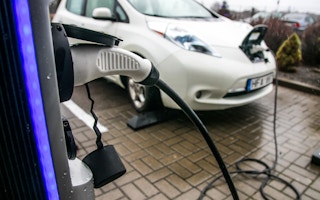Westpac NZ has responded positively to the New Zealand government’s freshly released package of measures to stimulate electric vehicle uptake with the announcement of a new leasing product for institutional and corporate customers to make EVs more accessible.
Westpac NZ general manager commercial, corporate and institutional, Karen Silk, said the government’s package offered “some tangible steps to support increased uptake of EVs in New Zealand”.
“EVs have the potential to generate operating savings and other commercial benefits for businesses and could significantly help New Zealand meet its emissions reduction target,” Ms Silk said.
“As a sustainable company, we want to reduce our own emissions and we also want to help other companies do the same through green finance products like our lease offering.”
The bank also has five EVs being trialled in its own corporate fleet.
Other major companies jumping onboard the EV trend in NZ include Air New Zealand, which has purchased 75 EVs through LeasePlan.
Engineering services firm Downer purchased EVs for its Auckland and Hamilton operations in 2015, and civil engineers Fulton Hogan are also introducing EVs into the company’s passenger fleet. NZ Post has committed to investing $15 million in EVs for residential parcel delivery.
“
EVs have the potential to generate operating savings and other commercial benefits for businesses and could significantly help New Zealand meet its emissions reduction target.
Karen Silk, general manager, Westpac NZ
In announcing the new measures last week, NZ transport minister Simon Bridges said it was “clear that electric vehicles are the future”.
“A move from petrol and diesel to low emission transport is a natural evolution, and it is our aim to encourage that switch sooner, rather than later.”
Mr Bridges said the benefits included being cheaper to run than petrol or diesel vehicles, the ability to power them using the country’s renewable energy supply and a reduction in the nation’s emissions from the transport sector.
Barrier to households and businesses embracing EVs have included the limited selection of models available, a lack of widespread public charging infrastructure and a lack of awareness about electric vehicles, he said.
“The government can’t tackle these barriers alone. That’s why we’ve been working closely with the private sector and local government over the last year on what measures we can take that will have the greatest impact.”
The EV package includes extending the Road User Charges exemption on light electric vehicles and a new exemption for heavy electric vehicles until they make up two per cent of each category of the national fleet.
Mr Bridges said this would equate to savings of $600 a year for vehicle owners.
Other measures include funding of $1 million annually for a nationwide electric vehicle information and promotion campaign over five years, and a contestable fund of up to $6 million a year to encourage and support innovative low emission vehicle projects.
The government has set a target of approximately 64,000 EVs on the roads by 2021.
Mr Bridges said that with more than 80 per cent of the country’s electricity coming from hydro, geothermal and wind, the increased use of electric vehicles would replace petrol and diesel with “clean, green, locally produced energy”.
“If we start to replace New Zealand’s fleet with electric vehicles, we can begin to significantly reduce our greenhouse gas emissions,” he said.
This story was published with permission from The Fifth Estate.








